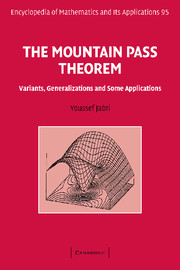Book contents
- Frontmatter
- Contents
- Introduction
- 1 Retrospective
- I First Steps Toward the Mountains
- II Reaching the Mountain Pass Through Easy Climbs
- III A Deeper Insight in Mountains Topology
- 9 The Limiting Case in the MPT
- 10 Palais-Smale Condition versus Asymptotic Behavior
- 11 Symmetry and the MPT
- 12 The Structure of the Critical Set in the MPT
- 13 Weighted Palais-Smale Conditions
- IV The Landscape Becoming Less Smooth
- V Speculating about the Mountain Pass Geometry
- VI Technical Climbs
- A Background Material
- Bibliography
- Index
10 - Palais-Smale Condition versus Asymptotic Behavior
Published online by Cambridge University Press: 04 September 2009
- Frontmatter
- Contents
- Introduction
- 1 Retrospective
- I First Steps Toward the Mountains
- II Reaching the Mountain Pass Through Easy Climbs
- III A Deeper Insight in Mountains Topology
- 9 The Limiting Case in the MPT
- 10 Palais-Smale Condition versus Asymptotic Behavior
- 11 Symmetry and the MPT
- 12 The Structure of the Critical Set in the MPT
- 13 Weighted Palais-Smale Conditions
- IV The Landscape Becoming Less Smooth
- V Speculating about the Mountain Pass Geometry
- VI Technical Climbs
- A Background Material
- Bibliography
- Index
Summary
One of the most influential ideas in the modern era of variational calculus is probably the new belief that the failure of the Palais-Smale condition is not always the final word and that a finer analysis of the behavior of non-convergent (PS) sequences may require new variational methods that would prevent such an eventuality.
I. Ekeland and N. Ghoussoub, New aspects of the calculus of variations in the large. Bull. Am. Math. Soc., 39, no. 2, 207–265 (2001)This chapter is a continuation of Chapter 2 wherein some introductory material on the Palais-Smale condition was given. In particular, we will see that (PS) implies a particular asymptotic behavior on the functional when some control is imposed on its level sets. We will also see some examples of functionals where the functional has the geometry of the MPT but does not satisfy (PS) and the inf max value is not critical. In the particular situation of the MPT, the geometric conditions give some second-order information on (PS) sequences.
The Palais-Smale condition is considered by many authors to be quite stringent. For example, Schechter gave a considerable effort trying to weaken or avoid its use in the particular situation of the MPT and got many interesting results in many directions.
- Type
- Chapter
- Information
- The Mountain Pass TheoremVariants, Generalizations and Some Applications, pp. 103 - 113Publisher: Cambridge University PressPrint publication year: 2003



